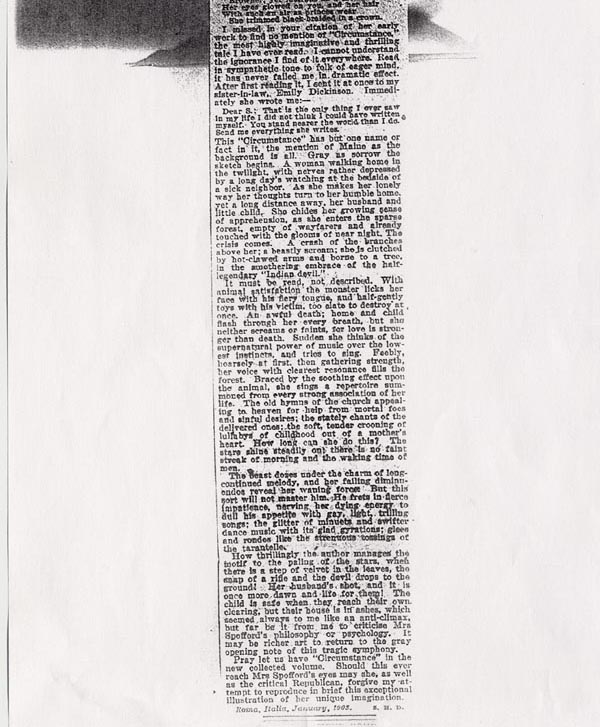
Her eyes glowed on you, and her hair
With such an air as princes wear
She trimmed black-braided in a crown.
I missed in your citation of her early
work to find no mention of "Circumstance,"
the most highly imaginative and thrilling
tale I have ever read. I cannot understand
the ignorance I find of it everywhere. Read
in sympathetic tone to folk of older eager mind,
it has never failed me in dramatic effect.
After first reading it, I sent it at once to my
sister-in-law, Emily Dickinson. Immedi-
ately she wrote me:--
Dear S.: That is the only thing I ever saw
in my life I did not think I could have written
myself. You stand nearer the world than I do.
Send me everything she writes.
This "Circumstance" has but one name or
. fact in it, the mention of Maine as the
background is all. Gray as sorrow the
sketch begins. A woman walking home in
the twilight, with nerves rather depressed
by a long day's watching at the bedside of
a sick neighbor. As she makes her lonely
way her thoughts turn to her humble home,
yet a long distance away, her husband and
little child. She chides her growing sense
of apprehension, as she enters the sparse
forest, empty of wayfarers and already
touched with the glooms of near night. The
crisis comes. A crash of the branches
above her; a beastly scream; she is clutched
by hot-clawed arms and borne to a tree,
in the smothering embrace of the half-
legendary "Indian devil."
It must be read, not described. With
animal satisfaction the monster licks her
face with his fiery tongue, and half-gently
toys with his victim, too elate to destroy at
. once. An awful death; home and child
flash through her every breath, but she
neither screams nor faints, for love is stron-
ger than death [echoing ED]. Sudden she thinks of the
supernatural power of music over the low-
est instincts, and tries to sing. Feebly,
hoarsely at first, then gathering strength,
her voice with clearest resonance fills the
forest. Braced by the soothing effect upon
the animal, she sings a repertoire sum-
moned from every strong association of her
life. The old hymns of the church appeal-
ing to heaven for help from mortal foes
and sinful desires; the stately chants of the
delivered ones; the soft, tender crooning of
lullabys of childhood out of a mother's
heart. How long can she do this? The
stars shine steadily on; there is no faint
streak of morning and the waking time of
men.
The beast dozes under the charm of long-
continued melody, and her failing diminu-
endos reveal her waning force. But this
sort will not master him. He frets in fierce
impatience, nerving her dying energy to
dull his appetite with gay, light, trilling
songs; the glitter of minuets and swifter
dance music with its glad gyrations; glees
and rondos like the strenuous tossings of
the tarantelle.
How thrillingly the author manages the
motif to the paling of the stars, when
there is a step of velvet in the leaves, the
snap of a rifle and the devil drops to the
ground! Her husband's shot, and it is
once more dawn and life for them! The
child is safe when they reach their own
clearing, but their house is in ashes, which
seemed always to me like an anti-climax,
but far be it from me to criticise Mrs
Spofford's philosophy or psychology. It
may be richer art to return to the gray
opening note of this tragic symphony.
Pray let us have "Circumstance" in the
new collected volume. Should this ever
reach Mrs Spofford's eyes may she, as well
as the critical Republican, forgive my at-
tempt to reproduce in brief this exceptional
illustration of her unique imagination.
Rome, Italia, January, 1903. S.H.D.
------------------------------------------------------------------------------------------------------------------------------------------------------------------------------------------------------



